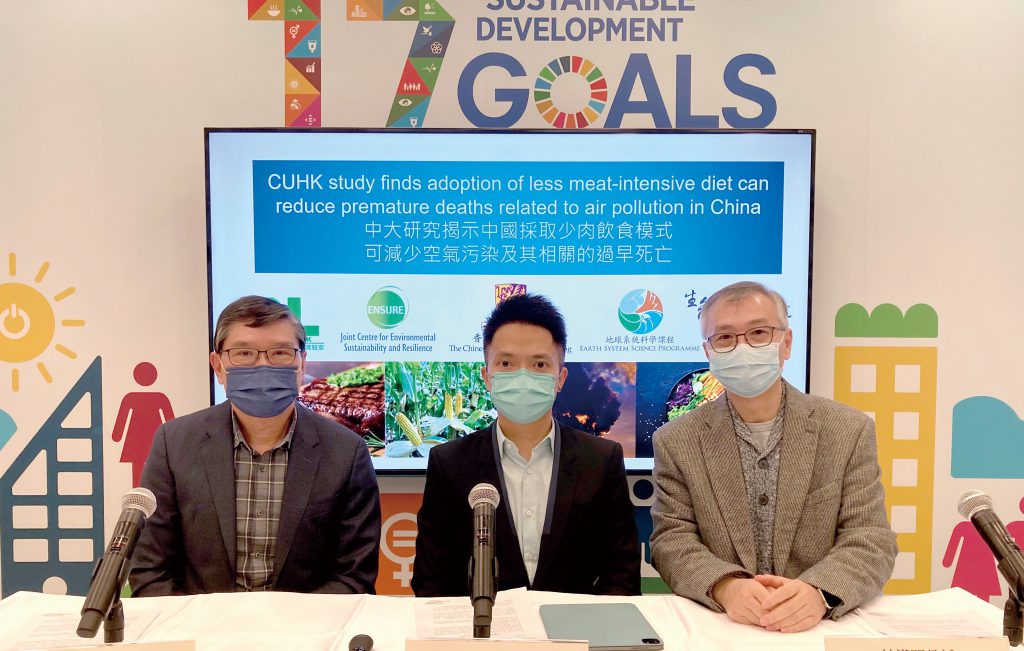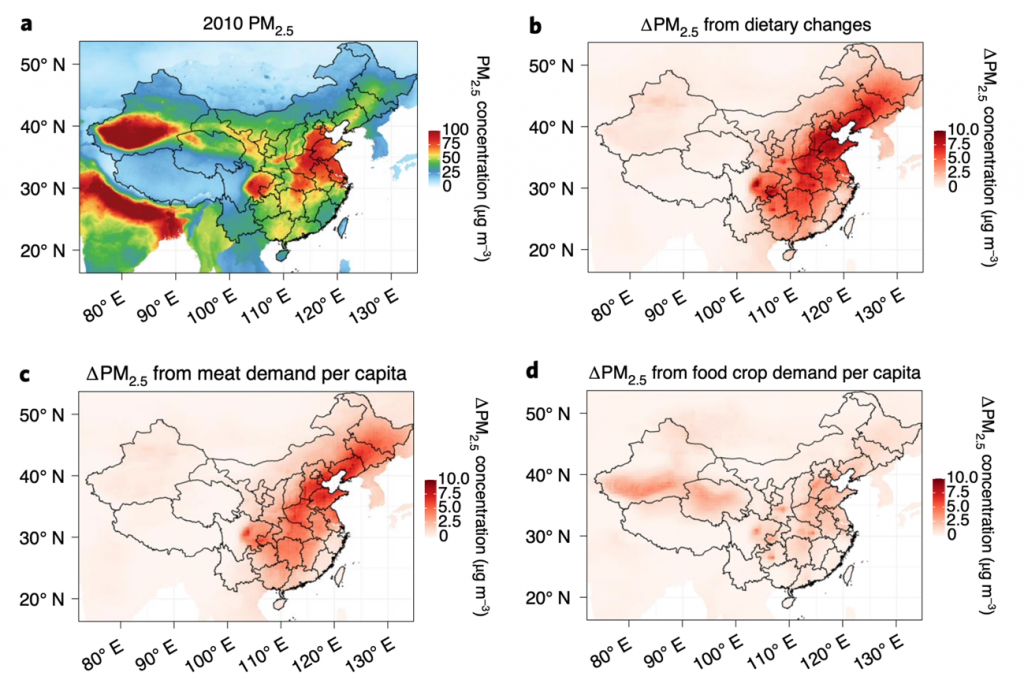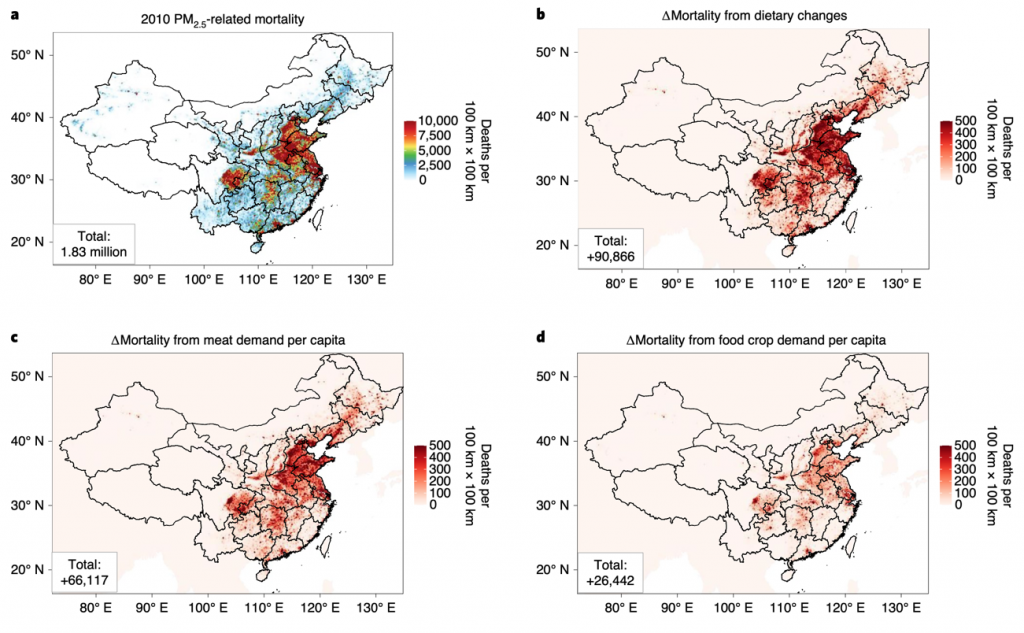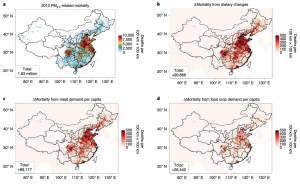CUHK
News Centre
CUHK interdisciplinary study finds adoption of a less meat-intensive diet can reduce premature deaths related to air pollution in China
A groundbreaking collaborative study led by The Chinese University of Hong Kong (CUHK) has revealed that shifting the current meat-intensive diet toward a less meat-intensive one can decrease agricultural ammonia emissions by about 20% and particulate matter by up to 6 micrograms per cubic metre, and avoid 75,000 annual premature deaths related to air pollution in China. This research analysed the changing patterns of food production and consumption in China over 1980-2010, and integrated various computational models to show that the rising demand for meat has contributed to worsening air quality and related mortality. This interdisciplinary work was conducted jointly with the University of Exeter (Exeter) under the CUHK – Exeter Joint Centre for Environmental Sustainability and Resilience (ENSURE), and was the first in the world to discover that the wide adoption of a more plant-based diet could serve as a strategy to mitigate the serious air pollution problems in China. These findings have been recently published in Nature Food, a prestigious journal in the food, agricultural and environmental sciences.
Higher meat consumption has led to worsening air quality and pollution-related deaths
Rapid economic and population growth in China commencing in the 1980s, as well as a fast nationwide shift from a plant-based toward a meat-intensive diet, have made China the number one meat consumer in the world. Data analysis from multiple sources over 1980-2010 unveils that meat production has increased from 15 to 80 megatons.
“Higher meat consumption not only contributes to greenhouse gas emissions and climate change, but our study found that it also leads to a more serious air pollution from particulate matter, which has long been a major environmental health problem in China. Animal waste in animal husbandry, as well as fertilisers used to grow feed crops release substantial amounts of ammonia gas into the air, contributing to the formation of particulate matter. Altogether changes in the Chinese diet, mainly in the form of higher meat consumption, have increased ammonia emissions from the agricultural sector by 63% and increased annual mean particulate matter concentration by up to 10 micrograms per meter cubed, which is roughly 20% of the total increase over the same period from all sources. This has led to ~90,000 more air pollution-related premature deaths every year,” said Professor Amos P. K. Tai, Associate Professor of the Earth System Science Programme in the Faculty of Science and leader of this study.
People living in the more developed provinces of China who can afford to eat more meat may run higher risks of direct diet-related health issues such as cardiovascular diseases, diabetes and obesity, but people in the poorer agricultural regions who consume less meat but produce most of the meat bear more of the indirect health impacts of degrading air quality. This research is the first to discover that higher meat consumption poses health risks to everyone via worsening air pollution, not only to those who eat more meat.
Plant-based diets help reduce air pollution and premature deaths
Professor Tai remarked, “Our study further estimated that if the healthier reference diets as recommended by the 2016 Chinese Dietary Guideline (CDG 2016) replace the current meat-intensive diets, they can reduce ammonia emissions, particulate matter concentration, and the related mortality. This is the first study to show that targeting the agricultural sector and the national diet can serve as an important strategy to mitigate air pollution in China, which has thus far mostly focused on lowering fossil fuel combustion in the energy and transportation sectors. It will also have tremendous co-benefits for climate change mitigation, because meat production is one of the biggest emitters of greenhouse gases.”
Professor Hon-Ming Lam, Choh-Ming Li Professor of Life Sciences, also a co-author of this paper added, “It is a good example to demonstrate the importance of cross-disciplinary research. The global model of atmospheric changes is now connected to grassroots agricultural production and people’s daily diets.”
This global cross-disciplinary study has been made possible with the support of ENSURE, with one of its research themes focused on how dietary changes in China affect the global environment. These valuable findings make clear that shifting from a meat-intensive diet to a plant-based one is a crucial way to simultaneously achieve food security, human and environmental health outcomes and to advance sustainability.
“This work clearly shows the importance of interdisciplinary research. Quantifying the effects of changing food habits on air pollution emissions requires bringing together experts from across many disciplines, including public health, agriculture, atmospheric modelling, data science and policy. The ENSURE joint centre was established to conduct internationally-leading research related to environment and sustainability by bringing together world-leading experts from a wide variety of disciplines from both the Chinese University of Hong Kong and the University of Exeter. These important results are a product of experts working together in the Joint Centre, integrating knowledge and data from different systems to develop new and impactful research,” said Professor Gavin Shaddick, Co-Director of ENSURE.
The full text of the journal can be found at: www.nature.com/articles/s43016-021-00430-6 or https://rdcu.be/cDlXN

Professor Amos Pui-Kuen Tai, Associate Professor, Earth System Science Programme, Faculty of Science, CUHK and leader of the study (middle), Professor Hon-Ming Lam, Choh-Ming Li Professor of Life Sciences, School of Life Sciences, Faculty of Science, CUHK and Co-Author of the paper (right), and Professor Joe Shing-Yip Lee, Professor, School of Life Sciences, Faculty of Science, CUHK and Co-Director of ENSURE.
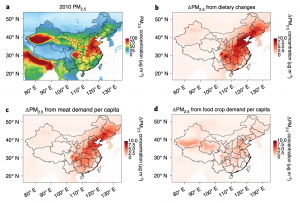
Worsening of particulate matter air quality due to dietary changes overall (including meat, feed crops, and food crops), rising demand for meat (including animal feed crops), and rising demand for food crops for direct human consumption.
